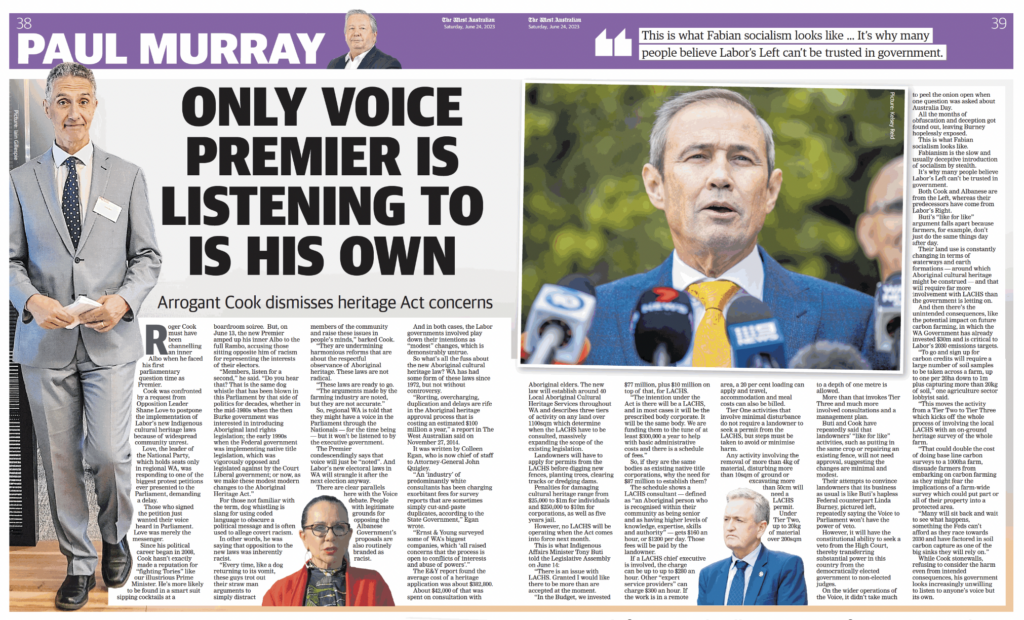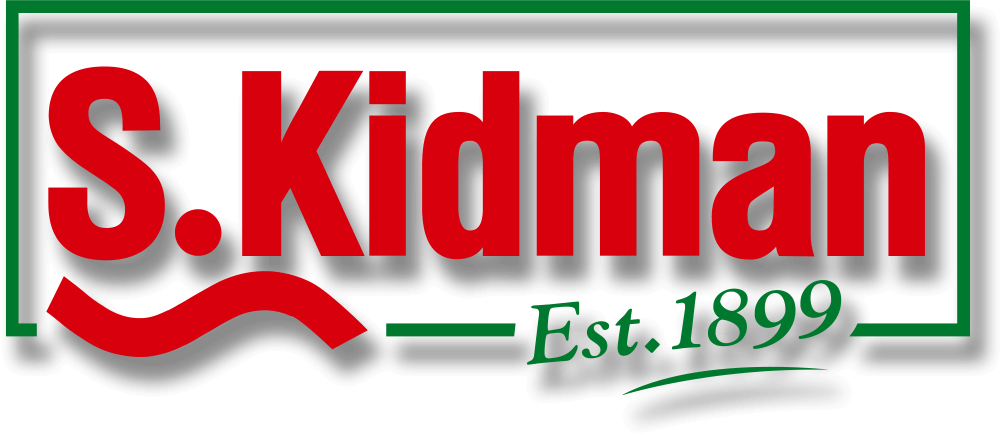
Article by Paul Murray courtesy of the West Australian.

Arrogant Cook dismisses heritage Act concerns.
Roger Cook must have been channelling an inner Albo when he faced his first parliamentary question time as Premier.
Cook was confronted by a request from Opposition Leader Shane Love to postpone the implementation of Labor’s new Indigenous cultural heritage laws because of widespread community unrest. Love, the leader of the National Party, which holds seats only in regional WA, was responding to one of the biggest protest petitions ever presented to the Parliament, demanding a delay.
Those who signed the petition just wanted their voice heard in Parliament. Love was merely the messenger.
Since his political career began in 2008, Cook hasn’t exactly made a reputation for “fighting Tories” like our illustrious Prime Minister. He’s more likely to be found in a smart suit sipping cocktails at a boardroom soiree. But, on June 13, the new Premier amped up his inner Albo to the full Rambo, accusing those sitting opposite him of racism for representing the interests of their electors.
“Members, listen for a second,” he said. “Do you hear that? That is the same dog whistle that has been blown in this Parliament by that side of politics for decades, whether in the mid-1980s when the then Burke government was interested in introducing Aboriginal land rights legislation; the early 1990s when the Federal government was implementing native title legislation, which was vigorously opposed and legislated against by the Court Liberal government; or now, as we make these modest modern changes to the Aboriginal Heritage Act.”
For those not familiar with the term, dog whistling is slang for using coded language to obscure a political message and is often used to allege covert racism.
In other words, he was saying that opposition to the new laws was inherently racist.
“Every time, like a dog returning to its vomit, these guys trot out their straw man arguments to simply distract members of the community and raise these issues in people’s minds,” barked Cook.
“They are undermining harmonious reforms that are about the respectful observance of Aboriginal heritage. These laws are not radical.
“These laws are ready to go.
“The arguments made by the farming industry are noted, but they are not accurate.” So, regional WA is told that they might have a voice in the Parliament through the Nationals — for the time being — but it won’t be listened to by the executive government.
The Premier condescendingly says that voice will just be “noted”. And Labor’s new electoral laws in WA will strangle it after the next election anyway.
There are clear parallels here with the Voice debate. People with legitimate grounds for opposing the Albanese Government’s proposals are also routinely branded as racist.
And in both cases, the Labor governments involved play down their intentions as “modest” changes, which is demonstrably untrue.
So what’s all the fuss about the new Aboriginal cultural heritage law? WA has had some form of these laws since 1972, but not without controversy.
“Rorting, overcharging, duplication and delays are rife in the Aboriginal heritage approval process that is costing an estimated $100 million a year,” a report in The West Australian said on November 27, 2014.
It was written by Colleen Egan, who is now chief of staff to Attorney-General John Quigley.
“An ‘industry’ of predominantly white consultants has been charging exorbitant fees for survey reports that are sometimes simply cut-and-paste duplicates, according to the State Government,” Egan wrote.
“Ernst & Young surveyed some of WA’s biggest companies, which ‘all raised concerns that the process is open to conflicts of interests and abuse of powers’.”
The E&Y report found the average cost of a heritage application was about $382,800.
About $42,000 of that was spent on consultation with Aboriginal elders. The new law will establish around 40 Local Aboriginal Cultural Heritage Services throughout WA and describes three tiers of activity on any land over 1100sqm which determine when the LACHS have to be consulted, massively expanding the scope of the existing legislation.
Landowners will have to apply for permits from the LACHS before digging new fences, planting trees, clearing tracks or dredging dams.
Penalties for damaging cultural heritage range from $25,000 to $1m for individuals and $250,000 to $10m for corporations, as well as five years jail.
However, no LACHS will be operating when the Act comes into force next month.
This is what Indigenous Affairs Minister Tony Buti told the Legislative Assembly on June 14:
“There is an issue with LACHS. Granted I would like there to be more than are accepted at the moment.
“In the Budget, we invested $77 million, plus $10 million on top of that, for LACHS.
“The intention under the Act is there will be a LACHS, and in most cases it will be the prescribed body corporate. It will be the same body. We are funding them to the tune of at least $300,000 a year to help with basic administrative costs and there is a schedule of fees.”
So, if they are the same bodies as existing native title corporations, why the need for $87 million to establish them?
The schedule shows a LACHS consultant — defined as “an Aboriginal person who is recognised within their community as being senior and as having higher levels of knowledge, expertise, skills and authority” — gets $160 an hour, or $1200 per day. Those fees will be paid by the landowner.
If a LACHS chief executive is involved, the charge can be up to up to $280 an hour. Other “expert service providers” can charge $300 an hour. If the work is in a remote area, a 20 per cent loading can apply and travel, accommodation and meal costs can also be billed.
Tier One activities that involve minimal disturbance do not require a landowner to seek a permit from the LACHS, but steps must be taken to avoid or minimise harm.
Any activity involving the removal of more than 4kg of material, disturbing more than 10sqm of ground or excavating more than 50cm will need a LACHS permit.
Under Tier Two, up to 20kg of material over 200sqm to a depth of one metre is allowed.
More than that invokes Tier Three and much more involved consultations and a management plan.
Buti and Cook have repeatedly said that landowners’ “like for like” activities, such as putting in the same crop or repairing an existing fence, will not need approval, suggesting the changes are minimal and modest.
Their attempts to convince landowners that its business as usual is like Buti’s hapless Federal counterpart Linda Burney, pictured left, repeatedly saying the Voice to Parliament won’t have the power of veto.
However, it will have the constitutional ability to seek a veto from the High Court, thereby transferring substantial power in this country from the democratically elected government to non-elected judges.
On the wider operations of the Voice, it didn’t take much to peel the onion open when one question was asked about Australia Day.
All the months of obfuscation and deception got found out, leaving Burney hopelessly exposed.
This is what Fabian socialism looks like.
Fabianism is the slow and usually deceptive introduction of socialism by stealth.
It’s why many people believe Labor’s Left can’t be trusted in government.
Both Cook and Albanese are from the Left, whereas their predecessors have come from Labor’s Right.
Buti’s “like for like” argument falls apart because farmers, for example, don’t just do the same things day after day.
Their land use is constantly changing in terms of waterways and earth formations — around which Aboriginal cultural heritage might be construed — and that will require far more involvement with LACHS than the government is letting on.
And then there’s the unintended consequences, like the potential impact on future carbon farming, in which the WA Government has already invested $30m and is critical to Labor’s 2030 emissions targets.
“To go and sign up for carbon credits will require a large number of soil samples to be taken across a farm, up to one per 20ha down to 1m plus capturing more than 20kg of soil,” one agriculture sector lobbyist said.
“This moves the activity from a Tier Two to Tier Three which kicks off the whole process of involving the local LACHS with an on-ground heritage survey of the whole farm.
“That could double the cost of doing base line carbon surveys to a 1000ha farm, dissuade farmers from embarking on carbon farming as they might fear the implications of a farm-wide survey which could put part or all of their property into a protected area.
“Many will sit back and wait to see what happens, something the Feds can’t afford as they race towards 2030 and have factored in soil carbon capture as one of the big sinks they will rely on.”
While Cook stonewalls, refusing to consider the harm even from intended consequences, his government looks increasingly unwilling to listen to anyone’s voice but its own.

